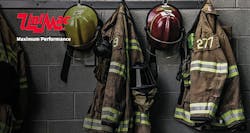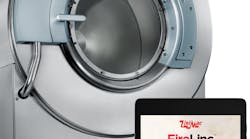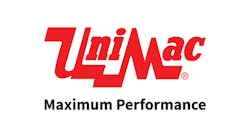Manufacturer's Corner: Keep PPE Cleaner with Firefighter-designed App
Manufacturers’ Corner content is sponsored by manufacturers and suppliers serving the fire service industry.
In 2018, the National Fire Protection Association (NFPA) will release its updated 1851 guidelines for the care and cleaning of personal protective equipment. In anticipation of new recommendations—that PPE be cleaned after every fire—volunteer firefighter and laundry expert Bill Brooks has worked with a team at UniMac to develop new software that helps fire stations maintain wash records for their entire inventory.
"Over the past 5 years, we’ve seen a lot more attention paid to carcinogens left on gear," Brooks says. "We’re finding more and more that cancer is just so prevalent among firefighters." Studies confirm the grim facts: not only is cancer responsible for 70% of line–of–duty deaths among career firefighters, but firefighters also face a doubled risk of many cancers—including mesothelioma and testicular cancers. Because Brooks is both a volunteer firefighter captain and a UniMac employee, he sees firsthand the many risks posed by incorrect PPE handling.
"There are so many improper practices in use right now. The way some firefighters do laundry is really doing more harm than good. I’ve heard stories of volunteers who will take PPE home and wash it in their home machines. The home washer they’re using is actually causing damage to the fabrics that make up the fire gear—a single set costs about $3,000. So they’re damaging expensive gear and bringing home contaminants that put their family at risk," Brooks explains. "We see so many people doing laundry incorrectly, we thought it was important to find a solution—to give people a method to ensure that they’re washing PPE correctly.”
That’s the motivation behind FireLincTM, a laundry–management application that Bill and the laundry team at UniMac have been developing since 2014. Fire stations can sync the app with inventory–tracking systems to record the time and date of each PPE wash–and when paired with UniMac models that feature TotalVueTM software, it can provide even more detailed information, such as length of wash and rinse cycles, and the temperatures within the cycles.
The NFPA—for which Brooks is an industry consultant—is currently studying ways to more effectively remove carcinogens from gear. As they work toward this goal, Brooks and his team are performing their own tests to optimize their machines’ cycles to better eliminate contaminants. As practices improve and new regulations are introduced, Brooks thinks that FireLinc’s ability to record data will be especially beneficial to fire stations. "Firefighters don’t want to deep–dive into laundry. They want a simple solution." He sees FireLinc as a simple, user-friendly way to offer assurance that best practices are being met every step of the way.
Brooks also thinks UniMac machines offer a unique benefit for fire stations. "Our machines last more than a decade, so they’re a good investment. We also do a lot of work along with other industry experts, educating firefighters and teaching them how to do laundry right. UniMac provides easy–to–follow instructions, simple standards and guidelines, and a range of resources for fire departments." He also notes that because UniMac’s data tracking and reporting software is cloud–based, updates can be pushed automatically to users as standards and guidelines change.
FireLinc is available for download for Android devices and 10 sites are already piloting the software, including companies in New York City, Framingham, Mass., and Milwaukee, Wis. Given the positive response to the software and the increasing emphasis on cancer prevention, Brooks thinks FireLinc is bound to have a big impact. "It’s state law to follow NFPA guidelines in Texas and Oklahoma. I think other states are likely to follow suit." Needless to say, FireLinc will be there to help.








